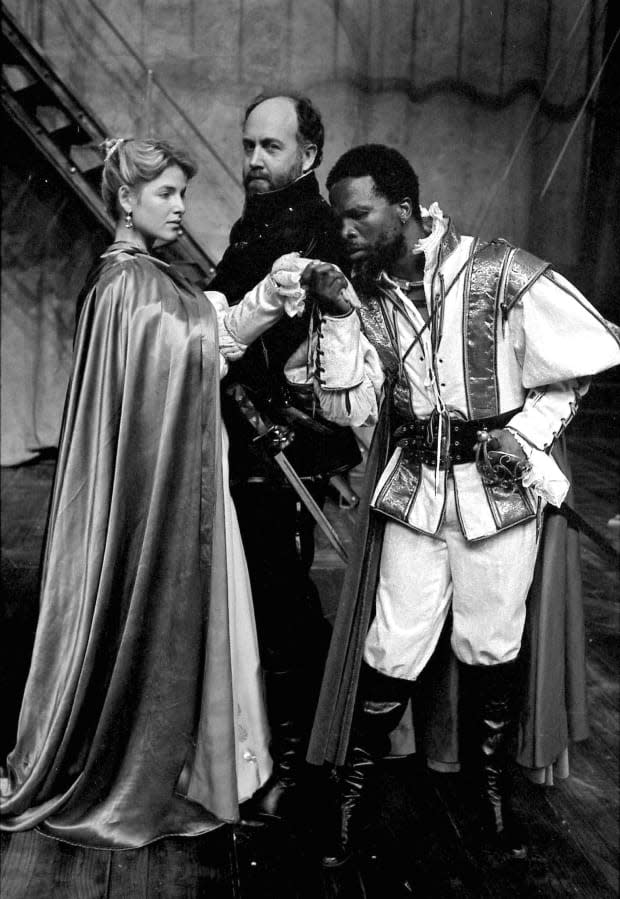To cancel or not to cancel Shakespeare? Meet the English professor flipping the script on the Bard

To cancel or not to cancel Shakespeare?
That is the question English professor Dennis Britton is asking second year students at the University of British Columbia in his aptly named course, "Cancel Shakespeare."
Britton's academic research focuses on the history of race and critical race theory, and he uses this lens in his course to explore the complicated history the playwright has with Black people.
As the theatre world begins to welcome audiences back after a two-year pandemic, Shakespeare costumes are likely being dusted off across the globe. But while the curtains were closed, issues of race took centre stage, including during the Black Lives Matter protests of 2020.

In response, over 300 BIPOC theatre makers signed their names on a statement titled We See You White American Theatre, demanding a more equitable and safe space in the industry.
And although film director Joel Coen recently cast Denzel Washington to play the titular character in Macbeth, generations of Black audiences have been disrespected by Bard characters in blackface.
Is it time to put William Shakespeare to bed? CBC journalist Bridgette Watson speaks with Britton to find out.
The following transcript has been edited for clarity and length.
Shakespeare wrote at least 37 plays for white actors and white audiences. Does he portray or make reference to Black characters in any of them?
Shakespeare uses colour symbolism with Black being associated with evil and white being good. His representations of blackness or Black people also have to do with lines that get sort of thrown in at various points by white characters. We definitely see ideas of anti-Blackness.
And, of course, this is also happening when Europeans are having an increased contact with Africa and the slave trade is emerging.

Othello is the most obvious character but throughout the plays there are also negative references to Black skin.
Rosalind, a white heroine in As You Like It, calls black ink on a letter "Ethiope words" because she doesn't like what they say.
In Titus Andronicus, the villain Aaron has a soul "black like his face." So you take joy and pleasure in his villainous activities and make the explicit connection between his black deeds and Black skin.
So is Shakespeare's work only for white people?
That's a complicated question. He's very much engaged with the belief systems and ways of understanding the world that his audience would have had, even if he is at times poking fun.
Also think about who has had access to Shakespeare and under what conditions. Literacy being a big issue, and the price of books and theatre tickets, all of that has a class dimension as well.

There's also the issue of Black actors wanting to perform Shakespeare and often not finding a place for themselves in professional companies. This is why you get things like Laurence Olivier playing Othello in blackface even while the civil rights movement was gaining steam.
Can Shakespeare's plays truly be adapted to celebrate Black excellence?
I think so and I always want to go back to the fact that this is entertainment. We probably don't need another Romeo and Juliet set in the 16th century and theatre companies aren't really going for accuracy anyway because then you wouldn't see female actors. So the plays have already been updated and this just seems to be another way, another form of adapting, that could bring them new life.
I think some of the racial references can just easily be taken out and it have zero effect on the plot. Most audiences will not miss them because they don't know them intimately enough.

But you teach a university course called "Cancel Shakespeare." Are we adapting or abandoning...
There's a real sense now that we want more women and more writers of colour in our curriculum, so something has to go and and Shakespeare should equally be on the chopping block. You can't make room for new voices without getting rid of some of the old.
He seems to be the only writer that must be read over and over even when there are some rather offensive attitudes in his work. In my own student experience, those lines were not dealt with when they did come up. I think those are the moments that are really worth interrogating in a classroom.
Do you think Shakespeare will still be assigned in high school in 50 years?
I'll be retired so it won't matter to me personally (laughs).
But there are so many writers of colour and writers from marginalized identities now adapting Shakespeare's plays, arguing with his plays, and as long as that continues, there will be the need to understand the original works.


